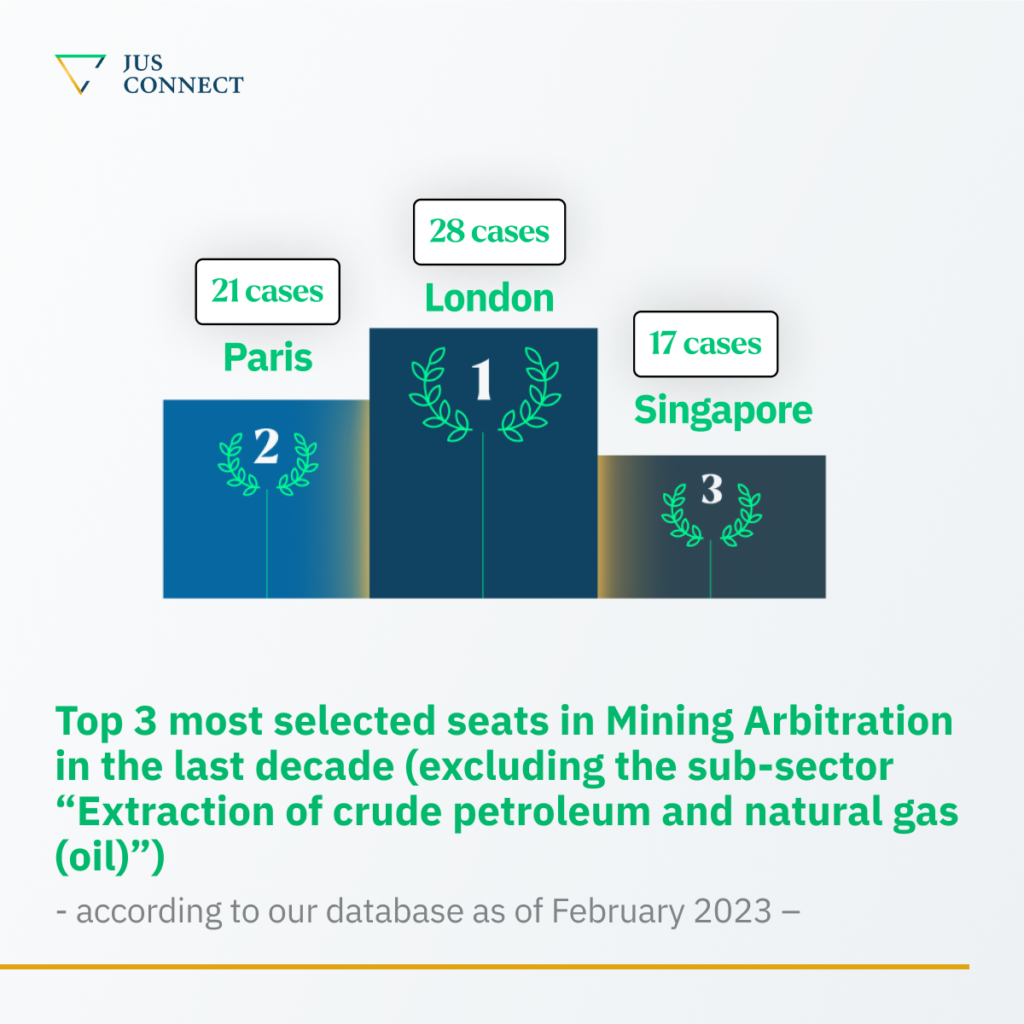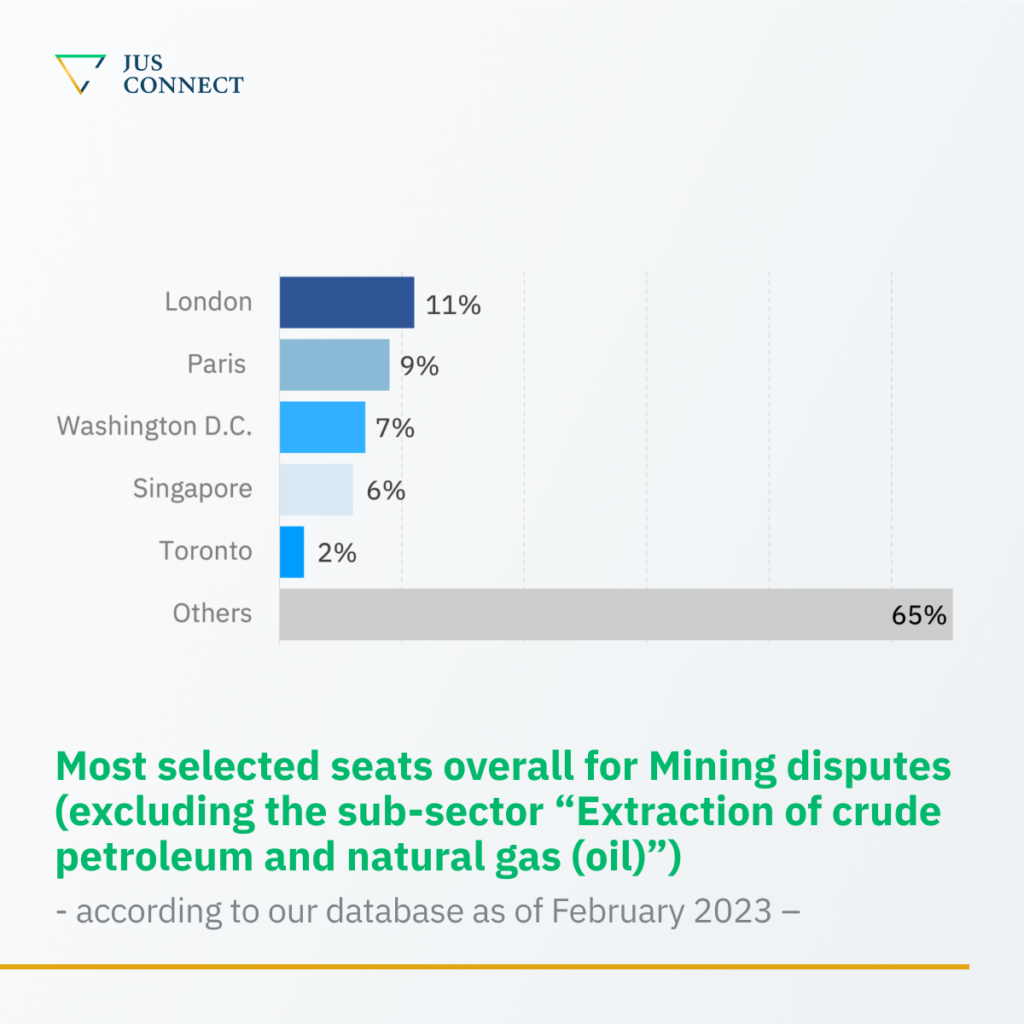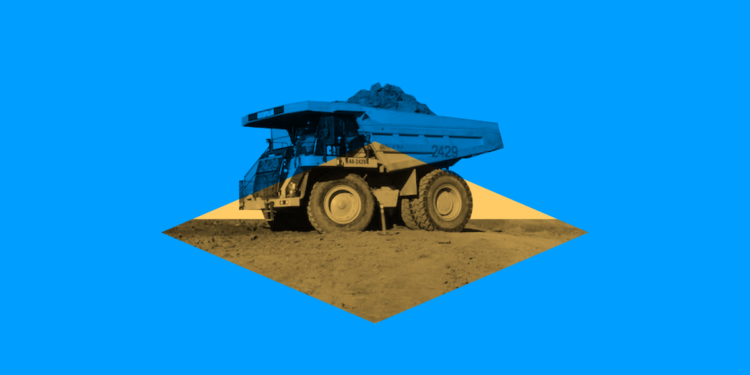This ranking was featured in our 2023 Mining Arbitration Report, which is part of a series of industry-focused arbitration reports edited by Jus Mundi and Jus Connect.
This issue explores the mining industry and presents a goldmine of information based on data available on Jus Mundi and Jus Connect as of February 2023. Discover updated insights into mining arbitration and exclusive statistics & rankings, as well as in-depth global and regional perspectives on mining projects, disputes, & arbitration from leading lawyers, arbitrators, experts, and in-house counsel.
The selection of the seat of arbitration is an important strategic choice, as it determines the law that applies to the arbitral procedure. Selecting an improper seat can result in several procedural and practical difficulties.
Our survey indicated 44 distinct seats in mining arbitration, some of which are established and popular seats of arbitration and others which are growing in popularity as of late. Unfortunately, in many cases, the seat of arbitration is unknown. Confidentiality might be one of the reasons this information is unavailable.

Key Takeaways
- The usual suspects comprise the top 3 most selected seats of arbitration in the last decade.
Disclaimer: In investor-State arbitration, ICSID is the primary arbitral institution for mining disputes. Although ICSID arbitrations technically do not have a legal seat, our database registers these cases as seated in Washington D.C. in order to differentiate them from cases with unavailable information regarding their seat. We have therefore excluded Washington D.C. from our below rankings.
- London and Paris are arguably the biggest global arbitration hubs. They are trusted seats within arbitration-friendly jurisdictions.
- Singapore is becoming a strong reference, both in APAC and globally. Singapore’s changes to its arbitration law in the last few years have undoubtedly played a positive role in this increase.
Toronto is also a popular seat of arbitration in the mining sector. While it does not tend to be a popular seat in most economic sectors, in the mining industry, however, Toronto plays an essential role. To find out why, take a look at Choosing the Seat for an International Mining Arbitration: The Case for Canada.

In GMAS v. Greenland and Denmark— a case we reported last year as one to keep on your radar —the parties chose to seat their arbitration in Copenhagen, thereby making its entry on our list of seats of arbitration in mining disputes (excluding the Mining & Quarrying sub-sector “Extraction of crude petroleum and natural gas (oil)”) in 2022. It is interesting to note that the Australian claimant agreed to a seat of arbitration located in the respondent State.
Although African States are heavily involved in mining arbitrations, very few seats chosen by parties are African. Of course, the political and social instabilities that put mining projects at risk in the first place and potentially lead them to arbitration also affect the legal and judicial landscape of these jurisdictions. However, Lagos (Nigeria) and the Lagos Chamber of Commerce International Arbitration Centre (LACIAC) are generally rising in popularity in arbitration.
According to our data, São Paulo (Brazil) is a rising seat for mining arbitration in Latin America. Câmara de Arbitragem do Mercado (CAM) and the Center for Arbitration and Mediation of the Chamber of Commerce Brazil-Canada (CAM-CCBC) have both handled mining cases in the last decade.
In commercial arbitration, regional parties tend to prefer a local seat of arbitration, which is not the case when at least one of the parties involved is foreign, even when the object of the dispute or matter is set in the region.
The development of Brazilian arbitral institutions and seats is largely due to the favorable Brazilian Arbitration Act (BAA) enacted 26 years ago. Since then, commercial arbitration has become the country’s most commonly used method of alternative dispute resolution.
Unfortunately, this may all change if the Brazilian Congress approves Bill No. 3,923/21 — meant to amend the BAA. According to the Brazilian Arbitration Committee (CBAr), the main arbitration entity in Brazil, the changes proposed in the bill increase legal uncertainty and weaken the country’s entire arbitration system. Its approval would represent a real step backward, as it promotes undue interference by the State in private proceedings.
Find more data-backed insights in our 2023 Mining Arbitration Report





